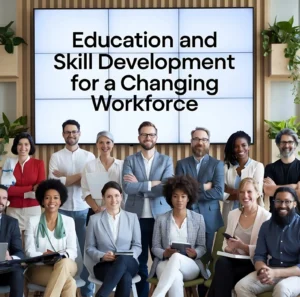
“Education and Skill Development for a Changing Workforce“
In an era marked by rapid technological advancements and global economic shifts, the workforce is undergoing a dramatic transformation. Traditional jobs are evolving, new roles are emerging, and the skills required to succeed are changing faster than ever before. In this context, education and skill development play a critical role in preparing individuals and societies to adapt and thrive. This article delves into the importance of education and skill development for a changing workforce, the challenges involved, and strategies for success.
The Evolving Nature of Work
The digital revolution has redefined the way we work. Automation, artificial intelligence (AI), and machine learning are replacing repetitive tasks and creating new opportunities in areas like data science, cybersecurity, and green energy. According to the World Economic Forum’s Future of Jobs Report, by 2025, half of all employees will need reskilling as the adoption of technology accelerates.
Additionally, the gig economy, remote work, and globalization are reshaping workforce dynamics. These trends demand a workforce that is not only technologically adept but also flexible, creative, and able to learn continuously.
The Importance of Lifelong Learning
Gone are the days when a degree guaranteed a lifetime career. Today, lifelong learning is essential for staying relevant in the workforce. This concept involves continuously updating skills and acquiring new knowledge to meet evolving industry demands. Lifelong learning ensures individuals can:
- Adapt to New Technologies: As industries integrate AI, robotics, and other technologies, employees need to stay updated with the latest tools and platforms.
- Enhance Employability: Keeping skills current makes individuals more attractive to employers and reduces the risk of job displacement.
- Foster Innovation: A well-educated workforce drives creativity and problem-solving, leading to innovation and economic growth.
Key Skills for the Future Workforce
To succeed in the future workforce, individuals must focus on developing a mix of technical and soft skills. Some of the most in-demand skills include:
- Digital Literacy: Proficiency in digital tools, data analysis, and emerging technologies like blockchain and AI.
- Critical Thinking and Problem-Solving: The ability to analyze complex situations and develop effective solutions.
- Emotional Intelligence: Skills like empathy, communication, and teamwork are vital for collaboration and leadership.
- Adaptability and Resilience: The capability to navigate change and overcome challenges in dynamic environments.
- Cultural Competence: Understanding and respecting diverse perspectives, is essential in a globalized workplace.
Challenges in Education and Skill Development
While the importance of education and skill development is clear, significant challenges remain:
- Access to Quality Education: Many individuals, particularly in developing regions, lack access to quality educational resources, creating a digital divide.
- Outdated Curricula: Traditional education systems often fail to keep pace with industry needs, leaving graduates unprepared for the modern workforce.
- Cost of Training: Professional development programs can be expensive, limiting opportunities for low-income individuals.
- Resistance to Change: Both organizations and individuals may resist adopting new learning methods or technologies, hindering progress.
Strategies for Effective Skill Development
Addressing these challenges requires a multi-faceted approach involving governments, educational institutions, businesses, and individuals. Here are some strategies:
- Promote STEM Education: Emphasizing science, technology, engineering, and mathematics (STEM) subjects in schools can prepare students for technology-driven careers.
- Integrate Soft Skills Training: Alongside technical education, schools and workplaces should focus on developing communication, leadership, and interpersonal skills.
- Expand Access to Online Learning: Platforms like Coursera, Udemy, and Khan Academy make high-quality education accessible to a broader audience, enabling self-paced learning.
- Encourage Public-Private Partnerships: Collaboration between governments, businesses, and educational institutions can align curricula with industry needs and fund skill development initiatives.
- Offer Lifelong Learning Incentives: Companies can provide employees with opportunities for continuous education, such as subsidized courses, workshops, and certifications.
- Upskilling and Reskilling Programs: Organizations should invest in training programs that help employees transition to new roles as technology evolves.
The Role of Governments and Policymakers
Governments have a crucial role in shaping a workforce ready for the future. By investing in education, creating policies that support skill development, and encouraging innovation, they can ensure economic growth and social stability. Initiatives like free or subsidized education, vocational training, and tax incentives for skill development programs can bridge the skills gap.
The Benefits of a Skilled Workforce
Investing in education and skill development yields significant benefits for individuals, businesses, and society:
- Increased Productivity: A skilled workforce is more efficient and capable of driving innovation.
- Economic Growth: Countries with well-educated populations tend to experience higher economic development.
- Reduced Unemployment: Skill development initiatives can help bridge the gap between job seekers and employers, lowering unemployment rates.
- Enhanced Job Satisfaction: Continuous learning fosters personal and professional growth, leading to greater job fulfillment.
Conclusion
In a rapidly changing world, education, and skill development are the cornerstones of a resilient and adaptable workforce. By fostering a culture of lifelong learning and addressing barriers to education, we can empower individuals to navigate the challenges of a dynamic labor market. Governments, organizations, and individuals must work together to ensure that the workforce of tomorrow is equipped to innovate, adapt, and thrive in an ever-evolving global economy.
